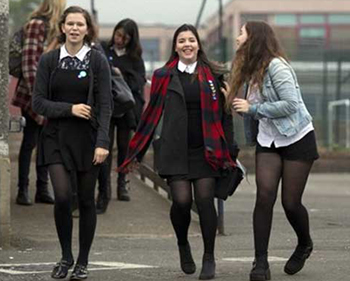London, Jun 15: An all-girls school in the UK has banned senior students from wearing short skirts, instructing them to wear "sober" suits and minimal makeup in bid to keep the pupils "committed to learning".
 St Margaret's School, a 28,500 pounds-a-year boarding school in Bushey, Hertfordshire, has banned A-level students from wearing short skirts.
St Margaret's School, a 28,500 pounds-a-year boarding school in Bushey, Hertfordshire, has banned A-level students from wearing short skirts.
Rose Hardy, headmistress of the school, has insisted on a strict new dress code of "sober" suits and minimal makeup because, she says, "a smart presentation reflects a professional and focused attitude".
The move has, however, not gone down well with parents who have complained about the uniform, being introduced next term, with one labelling it "funereal" and calling for greater freedom for pupils to express themselves, The Telegraph reported.
"I am at a loss to understand why you would impose such an austere, funereal and outdated dress code on our young women," the parent wrote to the school.
Hardy has defended the school's decision, saying, "Girls, in particular, need to feel good about themselves aesthetically, and these changes are aimed at allowing them to remain committed to learning, instead of having the added pressure of deciding what to wear every morning."
"We want them to be happy, confident and comfortable, as they make some of the most important decisions of their academic lives. The sixth form in particular, are also ambassadors for the school and are role models for the younger girls," she was quoted as saying by the daily.
Calling for a tailored suit which must "match both in colour and material", the dress code also bans socks, insisting that girls must wear tights that are natural or dark in colour, and says that make and nail varnish must be kept "discreet".
It also states that "hairstyles should be neat and long hair should be tied back for science and practical subjects."
The school insists that the idea of the new dress code is in keeping with the "whole Steve Jobs...ethos of simplicity by wearing the same style of clothing everyday so they (the girls) can focus on more important decisions instead of small ones".





Comments
Add new comment